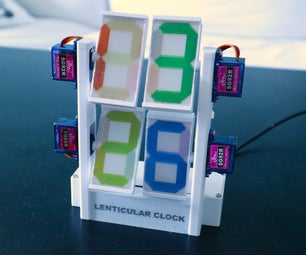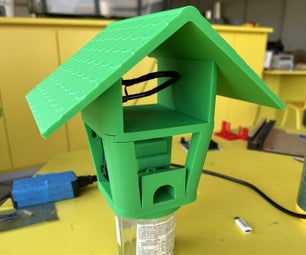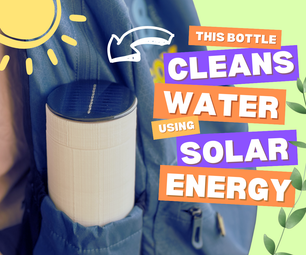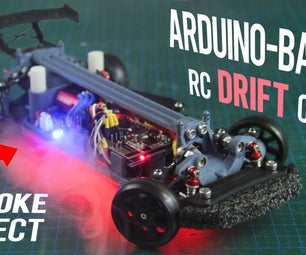Introduction: Automatic Alcohol Dispenser for Hands Without Arduino or Microcontrollers
Video Tutorial
Step 1: Start
In this tutorial we will see how to create an automatic alcohol dispenser with water, to disinfect your hands. It is activated by approaching the hand to the reflective infrared sensor tcrt5000l, whose signal is amplified by an operational amplifier ua741cp. The output of this integrated is connected to the base of the pnp tip42c transistor, which is in charge of controlling a direct current motor. The motor together with other objects printed in 3d, create an electric pump, which is capable of supplying the alcohol to our hands with a hose that can be taken from a macro dropper, which are used in medicine.
Step 2: Electronic Diagram
Step 3: PCB
Step 4: TCRT500L
DESCRIPTION
The TCRT5000 and TCRT5000L are reflective sensors, which include an infrared emitter and a phototransistor in a lead package that blocks visible light. Package Includes two mounting clips. TCRT5000L is the long lead version.
CHARACTERISTICS
• Package type: leaded
• Detector type: phototransistor
• Dimensions (L x W x H in mm): 10.2 x 5.8 x 7
• Maximum operating distance: 2.5 mm
• Operating range within> 20% of relative collectorCurrent: 0.2mm to 15mm
• Typical Output Current Under Test: IC = 1mA
• Daylight Blocking Filter
• Emitter Wavelength: 950nm
• Lead Free Solder (Pb) Released
• Complies with 2002 RoHS Directive / 95 / EC and inaccordance with WEEE 2002/96 / CEAPPLICATIONS
• Position sensor for axis encoder
• Detection of reflective material such as paper, IBM cards,magnetic tapes, etc.
• Limit switch for mechanical movements in VCR
• General purpose: where space is limited
Step 5: TIP42C
Transistor polarity: PNP
MAXIMUM SPECIFICATIONS
Total Device Dissipation (Pc): 65 W
Collector-base voltage (Vcb): 140 V
Collector-Emitter Voltage (Vce): 100 V
Emitter-base voltage (Veb): 5 V
Maximum DC collector current (Ic): 6 A
Maximum operating temperature (Tj): 150 ° C
ELECTRICAL CHARACTERISTICS Current product - gain - bandwidth (ft): 3 MHz
Continuous current gain (hfe): 20
Packaging / Case: TO220
Step 6: UA741CP
characteristics
• Short circuit protection
• Zero compensation voltage capacity
• Large common and differential mode voltage Ranks
• No frequency compensation required
• No lock Applications
• DVD Recorders and Players
• Professional Audio Mixers
Description
The µA741 is a general-purpose operating device.amplifier with zero capacity of compensated voltage.The high common mode input voltage range and theabsence of lockout makes the amplifier ideal forvoltage follower applications. The device isshort circuit protected and the internal frequencycompensation ensures stability without externalcomponents.
Step 7: DIODE 1N4007
Step 8: RESISTOR 10K
Step 9: RESISTOR 150 OHM
Step 10: RESISTOR 220 OHM
Step 11: ENGINE
Step 12: WATER PUMP (PREFERABLY)
Step 13: MACRO DRIPPER
Step 14: POTENTIOMETER
Step 15: EXPERIMENTAL PLATE
Step 16: ARMED CIRCUIT IN EXPERIMENTAL PLATE
To put together this start-up project we can put it together on an experimental plate like the one published above, or on a breadboard.
This is good, for the experimentation stage, but once we have everything assembled and working correctly, we must take the next step.
Step 17: Gerber File
Subsequently, the final circuit was designed, and the necessary gerber files were generated to order the printed circuit
Download this gerber file from here -> http://rogerbit.com/wprb/wp-content/uploads/2020/06/Gerber_PCB_DISPENZADOR_DE_ALCOHOL.zip
Step 18: 3D FILES
If you have a 3D printer, you can download the STL files, to print the pump and the bottle if you want to assemble, this hand sanitizer, or you can buy a submersible water pump, very cheap on any internet site and use any plastic container that have unoccupied at home.
Download STL file here -> http://rogerbit.com/wprb/wp-content/uploads/2020/06/sanitizador.zip
Step 19: The End
SUBSCRIBE: https://www.youtube.com/user/carlosvolt?sub_confirmation=1 (Don't forget to activate it )
Secondary channel: https://www.youtube.com/channel/UCjES9aB4g1F3IQbA...
Instagram: https://www.instagram.com/carlosvolt_tutoriales/
Tik Tok: https://www.instagram.com/carlosvolt_tutoriales/
Fanpage: https://www.instagram.com/carlosvolt_tutoriales/
Facebook: https://www.instagram.com/carlosvolt_tutoriales/
Twitter: https://www.instagram.com/carlosvolt_tutoriales/
Donations by paypal https://www.instagram.com/carlosvolt_tutoriales/ or donacion@rogerbit.com











